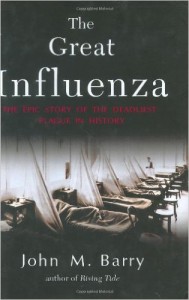 In The Great Influenza, award-winning historian John M. Barry explores how early 20th century advances in epidemiology and the efforts of heroic health professionals left lasting legacies for today, but failed in the face of their own era’s political, institutional, and cultural obstacles. No disease the world has ever known even remotely resembles the great influenza epidemic of 1918 that exploded across the world with unequaled ferocity and speed. It killed more people in twenty weeks than AIDS killed in twenty years; it killed more people in a year than the plagues of the Middle Ages killed in a century. Even as society approached collapse, a handful of heroic researchers stepped forward, risking their lives to confront this strange disease. William Welch at the newly formed Johns Hopkins Medical School and colleagues at Rockefeller University and others from around the country revolutionized American science and public health. Their work in this crisis led to crucial discoveries that we are still using and learning from today. Barry explores how the deadly confluence of biology and politics created conditions in which the virus thrived. He captures the sense of panic and despair that overwhelmed stricken communities and hits hard at those who failed to use their power to protect the public good. Society’s ability to survive another devastating flu pandemic, Barry argues in The Great Influenza is as much a political question as a medical one.
In The Great Influenza, award-winning historian John M. Barry explores how early 20th century advances in epidemiology and the efforts of heroic health professionals left lasting legacies for today, but failed in the face of their own era’s political, institutional, and cultural obstacles. No disease the world has ever known even remotely resembles the great influenza epidemic of 1918 that exploded across the world with unequaled ferocity and speed. It killed more people in twenty weeks than AIDS killed in twenty years; it killed more people in a year than the plagues of the Middle Ages killed in a century. Even as society approached collapse, a handful of heroic researchers stepped forward, risking their lives to confront this strange disease. William Welch at the newly formed Johns Hopkins Medical School and colleagues at Rockefeller University and others from around the country revolutionized American science and public health. Their work in this crisis led to crucial discoveries that we are still using and learning from today. Barry explores how the deadly confluence of biology and politics created conditions in which the virus thrived. He captures the sense of panic and despair that overwhelmed stricken communities and hits hard at those who failed to use their power to protect the public good. Society’s ability to survive another devastating flu pandemic, Barry argues in The Great Influenza is as much a political question as a medical one.
